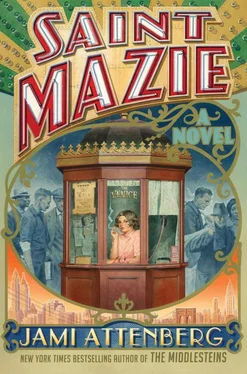He told me he was sorry I felt lonely. He told me to be careful, that I was precious. He held both of my hands in his. He comes into town every few months on business and he’d like to have coffee with me every so often. Would I like that, is what he asked me. Would I.
Mazie’s Diary, June 1, 1932
A postcard from Winky, thanking me.
It said: Safe & sound & loved.
Mazie’s Diary, November 2, 1932
Thirty-five years old. I wound up at Finny’s, no surprise there. George Flicker was at the bar and I got looped enough that I didn’t mind him looking at my bosom the way that he always does. Happy Birthday to me, why not have some fun? He walked me home and we kissed and kissed and kissed, and I let him put his hands on me for a minute or two or three. He’s an all right kisser. He said he learned everything he knows from French girls.
George Flicker
She said that? She did. Well, I suppose it was true then. I wasn’t trying to hide anything from you. I’ve told you everything else I know so far, haven’t I? I was just being respectful of the lady. My generation, we showed some respect. It feels good to show respect. It makes you feel like a man. I wasn’t going to kiss and tell unless I had to. And now I suppose I have to.
Mazie’s Diary, December 1, 1932
It’s cold now again, it won’t warm up for a long time. I’m worried about the fellas. I collect nickels and dimes and quarters. I line my pockets with them. I hand them out freely. I pray every night they won’t freeze to death.
Mazie’s Diary, December 15, 1932
Last night she stayed up cleaning the apartment, every inch of it, not just the kitchen but the toilet, too, and her bedroom, and my bedroom, too. She came in while I was sleeping. She was possessed by a cleaning demon. I thought maybe she was walking in her sleep. I tried to rouse her. I shook her by her shoulders. I said her name and I begged and then I gave up. I put the pillow over my head and waited until she left.
I would give anything to make this stop. I’m used to this pain — it feels so familiar, it’s like it’s my little pinky. But still I dare to dream of a life without it.
George Flicker
The month I can’t remember so well, but I believe it was early 1933. It was freezing out, just a bitter, bitter cold, and she’d been on the streets, and she came into Finny’s. Her cheeks were flushed and she looked very pretty. She’d been avoiding me since we kissed, or maybe I’d been avoiding her. But that night we were both exhausted, and we truly were so fond of each other that we gave in to it. We just liked each other and wanted to talk! And I think she needed to talk about Rosie with someone. It was this burden she carried with her. I had my burden; she had hers. And there are times when you need other people to witness your pain. Not anymore, I’m done with that. All my little aches and pains I’ve lived with long enough now, why bother? I’m one hundred years old. Guess what? I’m falling apart. But then we were young and we still felt entitled to some kind of relief. We believed in the possibility of relief. That we deserved a break. So we shared our problems. And then I knew all about Rosie, with the cleaning and the complaining and the in general obsessive behavior. And then we very naturally came up with this solution to both of our problems. Oh, we thought we were so smart. We were even a little smug about the whole thing. We thought we knew our family so well. Our people, they were our people. But we never could have predicted how it was going to turn out in the end.
Mazie’s Diary, February 14, 1933
Well George Flicker and I had an interesting talk tonight. Who knew George Flicker could be interesting?
He’s working for this developer, and there’s going to be a new building downtown. It’s going to be the finest building in the neighborhood, with a beautiful garden in a private courtyard. He told me that when I sit in that garden l’ll feel like I left New York City behind.
It’ll be difficult to get into the building. Everyone wants in. But he thought he could do it, could secure a small apartment for himself and his uncle. He could barely afford it but he thought he could make it happen. A chance to get out of the tenements, he’d make it happen. And he could secure another one for me and Rosie, we could be neighbors in this new building. And then he said the very interesting part, which was that maybe when we moved in there, Rosie could watch over Al.
He said: She just needs someone to worry about is what it sounds like to me.
I could not argue with him on that matter.
He said: And Al, he just needs someone to look after him. I can’t do it forever, Mazie. I need to have a life of my own. And you do, too.
I said: When can we move?
He said the building wouldn’t be ready till next year. That they had to tear down all these filthy tenements there first, then build the new one. They’re going to build fast though, he told me.
He said: Hold on, Mazie. Just hold on.
Elio Ferrante
Lung Block, yea, Lung Block. I don’t teach it anymore. I taught it a few times, and honestly? It grosses the kids out. Breadlines, they get, they nod their heads. Lung Block, it’s gross, it’s terrifying, and it doesn’t really educate them about anything new. They kind of already know about mold and bad air, and if they really want to learn about the specifics of mold, I’ll trust their health or science instructors to educate them on the particular details. But, just to explain here, these apartments had maybe one or two tiny windows and no ventilation, and they were packed with people. And they got sick.
There were more than a few Lung Blocks in New York City. So many of the tenements were terrible for air quality, germs, mold, but this one particular block, down by the water — north of the South Street Seaport, like southeast of Chinatown — a good percentage of the tenants there got sick with respiratory illnesses. Tuberculosis for one, which is highly contagious, so once it started, they all fell down. There were just germs everywhere. And hundreds of families lived there; everyone crammed into these small spaces. On top of that there were bunch of bars and brothels. It was just a seedy, germy block. Hundreds of people died. This was in the late 1920s. And New York being New York, instead of fixing the buildings, they just decided to tear them down and start over. And that is how Knickerbocker Village came into being.
Lydia Wallach
I should have had two more great-uncles, but they died from tuberculosis. They lived in a bad building. It wasn’t a bad building when they moved in, but it became one. By the time they figured out they should move somewhere else, it was too late. They were no longer in control of their destiny, or the destiny of their children. And so my mother’s father grew up with tragedy, and then my mother grew up in the shadow of tragedy, and then I suppose I grew up in whatever shade was left behind. Rudy with his heart attacks, two dead great-uncles. These stories that people pass on. You feel them. They haunt you.
Pete Sorensen
A thing you and I talked about for a while is how she starts to disappear into these men. Like we felt like we lost her to them. Like she became so obsessed with them that the other parts of her started to disappear. Or maybe those parts were visible to someone else? But the diary totally changes. It’s just about these men; that’s all she cares about. And you were like, “I get it. I get the obsession.” And I was like, “I get it, but I reject it. Because there’s more to life than just that. You have to care about more than one thing.”
Читать дальше












